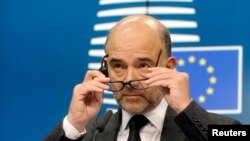The European Union has drawn up a wish list of almost 2,000 projects worth 1.3 trillion euros ($1.59 trillion) for possible inclusion in an investment plan to revive growth and jobs without adding to countries' debts.
Investment has been a casualty of the financial crisis in Europe, tumbling around 20 percent in the euro zone since 2008, according to the European Central Bank, and countries want to ease off on the budget rigor that has dominated policy so far.
Following a call by European Commission President Jean-Claude Juncker, EU governments have submitted projects ranging from a new airport terminal in Helsinki to flood defenses in Britain, according to a document seen by Reuters.
“Almost 2,000 projects were identified with a total investment cost of 1,300 billion euros, of which 500 billion are to be realized within the next three years,” said the document, which was drawn up by governments, the European Investment Bank and the European Commission. It will be discussed by EU finance ministers on Tuesday.
The EU's economics commissioner, Pierre Moscovici, said on Monday that the fragile economy “strongly underlined the case for the ambitious investment plan.”
But economists say there is no guarantee the projects will help cut near record unemployment, fend off deflation in the euro zone or help weak business confidence, while countries have so far been reluctant to come forward with public money.
Projects on the list, which officials stress is not definitive, also include housing regeneration in the Netherlands, a new port in Ireland and a 4.5 billion euro fast rail connection between Estonia, Latvia, Lithuania and Poland.
Other job-creating schemes involve refueling stations forhydrogen fuel cell vehicles in Germany, expanding high-speed broadband networks in Spain and making public buildings in France more energy-efficient. Almost a third of the projects are energy related, another third are focused on transport and the remainder on innovation, the environment and housing.
Grand bargain
The European Commission aims to have the first projects ready to attract private money in June. Many on the list have been frustrated by lack of financing or political problems affecting cross-broader projects.
Juncker presented a plan last month to leverage some 315 billion euros of largely private new investment in the EU, part of a wider plan to avoid years of low growth after a debt and banking crisis that nearly broke up the euro zone.
The bloc is setting aside 8 billion euros to help provide 21 billion euros of capital for a special fund managed with the European Investment Bank.
The Commission also wants countries to stump up money for the fund, spending that would not be included in debt and deficit calculations.
The investment plan forms what some see as a grand bargain with the European Central Bank.
In that plan, governments will commit to structural reforms and investments, giving the ECB cover to launch U.S.-style quantitative easing - buying sovereign bonds to inject money into the economy.
ECB President Mario Draghi will address euro zone finance ministers in Brussels on Monday and will return next week for a summit of EU leaders, where the recovery strategy is likely to be fleshed out.





